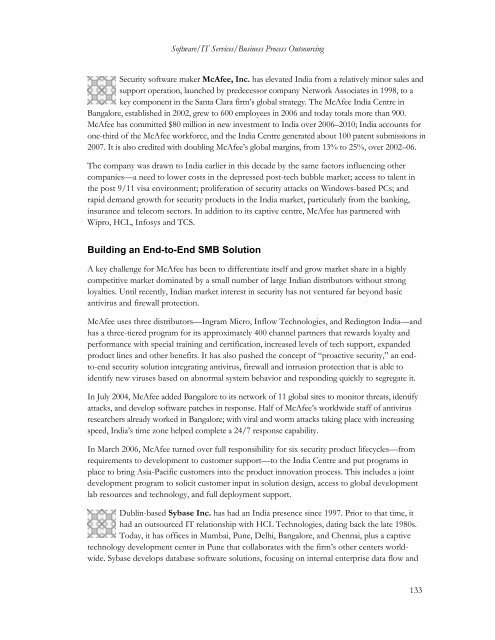PDF: 2962 pages, 5.2 MB - Bay Area Council Economic Institute
PDF: 2962 pages, 5.2 MB - Bay Area Council Economic Institute
PDF: 2962 pages, 5.2 MB - Bay Area Council Economic Institute
You also want an ePaper? Increase the reach of your titles
YUMPU automatically turns print PDFs into web optimized ePapers that Google loves.
Software/IT Services/Business Process Outsourcing<br />
Security software maker McAfee, Inc. has elevated India from a relatively minor sales and<br />
support operation, launched by predecessor company Network Associates in 1998, to a<br />
key component in the Santa Clara firm’s global strategy. The McAfee India Centre in<br />
Bangalore, established in 2002, grew to 600 employees in 2006 and today totals more than 900.<br />
McAfee has committed $80 million in new investment to India over 2006–2010; India accounts for<br />
one-third of the McAfee workforce, and the India Centre generated about 100 patent submissions in<br />
2007. It is also credited with doubling McAfee’s global margins, from 13% to 25%, over 2002–06.<br />
The company was drawn to India earlier in this decade by the same factors influencing other<br />
companies—a need to lower costs in the depressed post-tech bubble market; access to talent in<br />
the post 9/11 visa environment; proliferation of security attacks on Windows-based PCs; and<br />
rapid demand growth for security products in the India market, particularly from the banking,<br />
insurance and telecom sectors. In addition to its captive centre, McAfee has partnered with<br />
Wipro, HCL, Infosys and TCS.<br />
Building an End-to-End S<strong>MB</strong> Solution<br />
A key challenge for McAfee has been to differentiate itself and grow market share in a highly<br />
competitive market dominated by a small number of large Indian distributors without strong<br />
loyalties. Until recently, Indian market interest in security has not ventured far beyond basic<br />
antivirus and firewall protection.<br />
McAfee uses three distributors—Ingram Micro, Inflow Technologies, and Redington India—and<br />
has a three-tiered program for its approximately 400 channel partners that rewards loyalty and<br />
performance with special training and certification, increased levels of tech support, expanded<br />
product lines and other benefits. It has also pushed the concept of “proactive security,” an endto-end<br />
security solution integrating antivirus, firewall and intrusion protection that is able to<br />
identify new viruses based on abnormal system behavior and responding quickly to segregate it.<br />
In July 2004, McAfee added Bangalore to its network of 11 global sites to monitor threats, identify<br />
attacks, and develop software patches in response. Half of McAfee’s worldwide staff of antivirus<br />
researchers already worked in Bangalore; with viral and worm attacks taking place with increasing<br />
speed, India’s time zone helped complete a 24/7 response capability.<br />
In March 2006, McAfee turned over full responsibility for six security product lifecycles—from<br />
requirements to development to customer support—to the India Centre and put programs in<br />
place to bring Asia-Pacific customers into the product innovation process. This includes a joint<br />
development program to solicit customer input in solution design, access to global development<br />
lab resources and technology, and full deployment support.<br />
Dublin-based Sybase Inc. has had an India presence since 1997. Prior to that time, it<br />
had an outsourced IT relationship with HCL Technologies, dating back the late 1980s.<br />
Today, it has offices in Mumbai, Pune, Delhi, Bangalore, and Chennai, plus a captive<br />
technology development center in Pune that collaborates with the firm’s other centers worldwide.<br />
Sybase develops database software solutions, focusing on internal enterprise data flow and<br />
133








